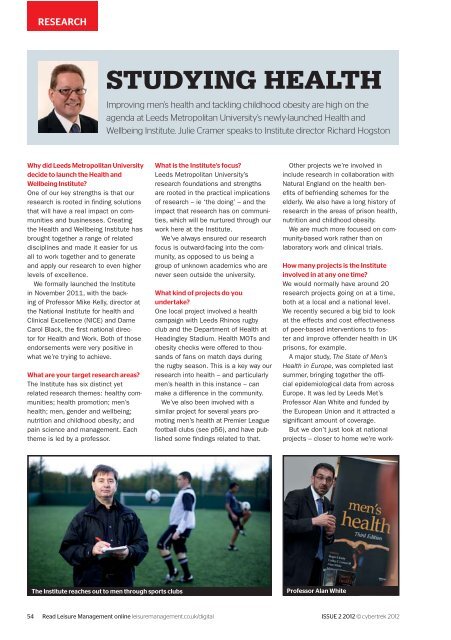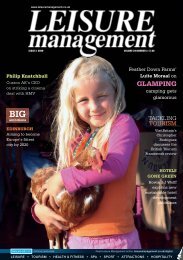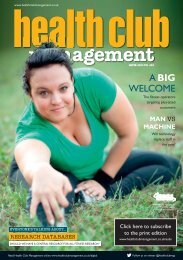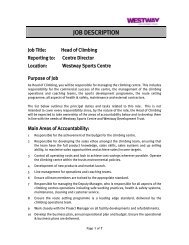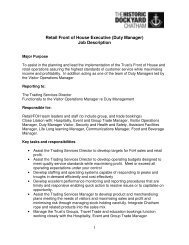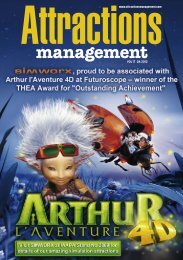sporting - Leisure Opportunities
sporting - Leisure Opportunities
sporting - Leisure Opportunities
You also want an ePaper? Increase the reach of your titles
YUMPU automatically turns print PDFs into web optimized ePapers that Google loves.
RESEARCH<br />
STUDYING HEALTH<br />
Improving men’s health and tackling childhood obesity are high on the<br />
agenda at Leeds Metropolitan University’s newly-launched Health and<br />
Wellbeing Institute. Julie Cramer speaks to Institute director Richard Hogston<br />
Why did Leeds Metropolitan University<br />
decide to launch the Health and<br />
Wellbeing Institute<br />
One of our key strengths is that our<br />
research is rooted in finding solutions<br />
that will have a real impact on communities<br />
and businesses. Creating<br />
the Health and Wellbeing Institute has<br />
brought together a range of related<br />
disciplines and made it easier for us<br />
all to work together and to generate<br />
and apply our research to even higher<br />
levels of excellence.<br />
We formally launched the Institute<br />
in November 2011, with the backing<br />
of Professor Mike Kelly, director at<br />
the National Institute for health and<br />
Clinical Excellence (NICE) and Dame<br />
Carol Black, the first national director<br />
for Health and Work. Both of those<br />
endorsements were very positive in<br />
what we’re trying to achieve.<br />
What are your target research areas<br />
The Institute has six distinct yet<br />
related research themes: healthy communities;<br />
health promotion; men’s<br />
health; men, gender and wellbeing;<br />
nutrition and childhood obesity; and<br />
pain science and management. Each<br />
theme is led by a professor.<br />
What is the Institute’s focus<br />
Leeds Metropolitan University’s<br />
research foundations and strengths<br />
are rooted in the practical implications<br />
of research – ie ‘the doing’ – and the<br />
impact that research has on communities,<br />
which will be nurtured through our<br />
work here at the Institute.<br />
We’ve always ensured our research<br />
focus is outward-facing into the community,<br />
as opposed to us being a<br />
group of unknown academics who are<br />
never seen outside the university.<br />
What kind of projects do you<br />
undertake<br />
One local project involved a health<br />
campaign with Leeds Rhinos rugby<br />
club and the Department of Health at<br />
Headingley Stadium. Health MOTs and<br />
obesity checks were offered to thousands<br />
of fans on match days during<br />
the rugby season. This is a key way our<br />
research into health – and particularly<br />
men’s health in this instance – can<br />
make a difference in the community.<br />
We’ve also been involved with a<br />
similar project for several years promoting<br />
men’s health at Premier League<br />
football clubs (see p56), and have published<br />
some findings related to that.<br />
Other projects we’re involved in<br />
include research in collaboration with<br />
Natural England on the health benefits<br />
of befriending schemes for the<br />
elderly. We also have a long history of<br />
research in the areas of prison health,<br />
nutrition and childhood obesity.<br />
We are much more focused on community-based<br />
work rather than on<br />
laboratory work and clinical trials.<br />
How many projects is the Institute<br />
involved in at any one time<br />
We would normally have around 20<br />
research projects going on at a time,<br />
both at a local and a national level.<br />
We recently secured a big bid to look<br />
at the effects and cost effectiveness<br />
of peer-based interventions to foster<br />
and improve offender health in UK<br />
prisons, for example.<br />
A major study, The State of Men’s<br />
Health in Europe, was completed last<br />
summer, bringing together the official<br />
epidemiological data from across<br />
Europe. It was led by Leeds Met’s<br />
Professor Alan White and funded by<br />
the European Union and it attracted a<br />
significant amount of coverage.<br />
But we don’t just look at national<br />
projects – closer to home we’re work-<br />
The Institute reaches out to men through sports clubs<br />
Professor Alan White<br />
54<br />
Read <strong>Leisure</strong> Management online leisuremanagement.co.uk/digital ISSUE 2 2012 © cybertrek 2012


